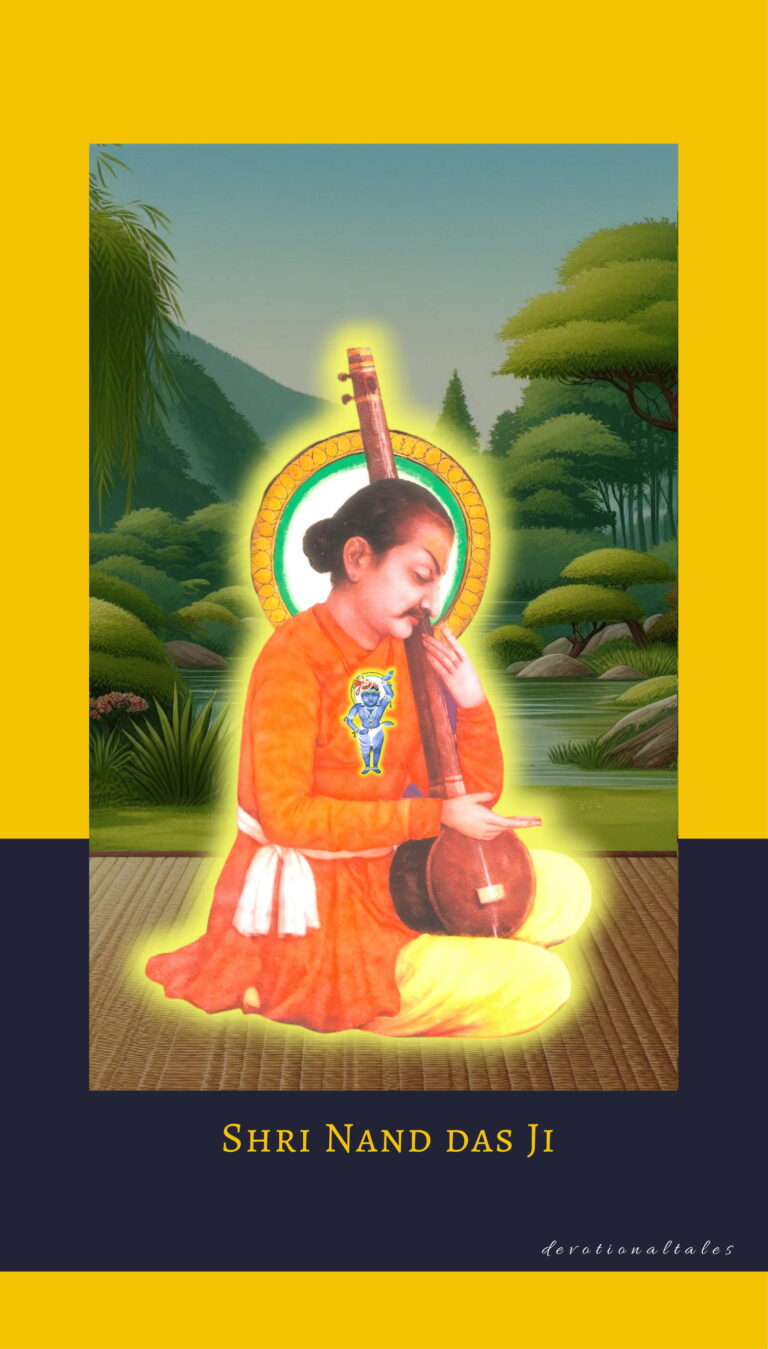
Shri Nand Das Ji (Asht-Sakha)
Birth of Shri Nanddas Ji
In the year 1513 AD, in a village called Rampur, (near Soron in the Etah district of Uttar Pradesh), Shri Nanddas Ji was born into a respected Shukla Brahmin family.
His father’s name was Jivaram, and his uncle was known as Atmaram.
Even from a young age, Nanddas Ji displayed signs of spiritual depth and a poetic talent that seemed to flow naturally from within.
What made his life even more special was his spiritual connection to none other than Goswami Tulsidas Ji, the revered poet of Shri Ramcharitmanas Ji.
Tulsidas Ji was considered his elder godbrother, and Nanddas Ji always looked up to him with immense respect, reverence, and admiration.
Shri Nanddas Ji’s path led him to become a devoted disciple of Gusain Shri Vitthalnath Ji. As his disciple, Nanddas Ji’s devotion deepened, and his poetic genius flourished even more.
He rose to become one of the Ashtachhap poets—a revered group of eight poets who were chosen to sing the divine pastimes of Lord Shri Krishna in the Vallabh sect.
His verses were not just poems—they were expressions of divine love, full of emotion, rhythm, and faith.
And so began the life of a poet whose verses still echo through temples, hearts, and the souls of those who listen.
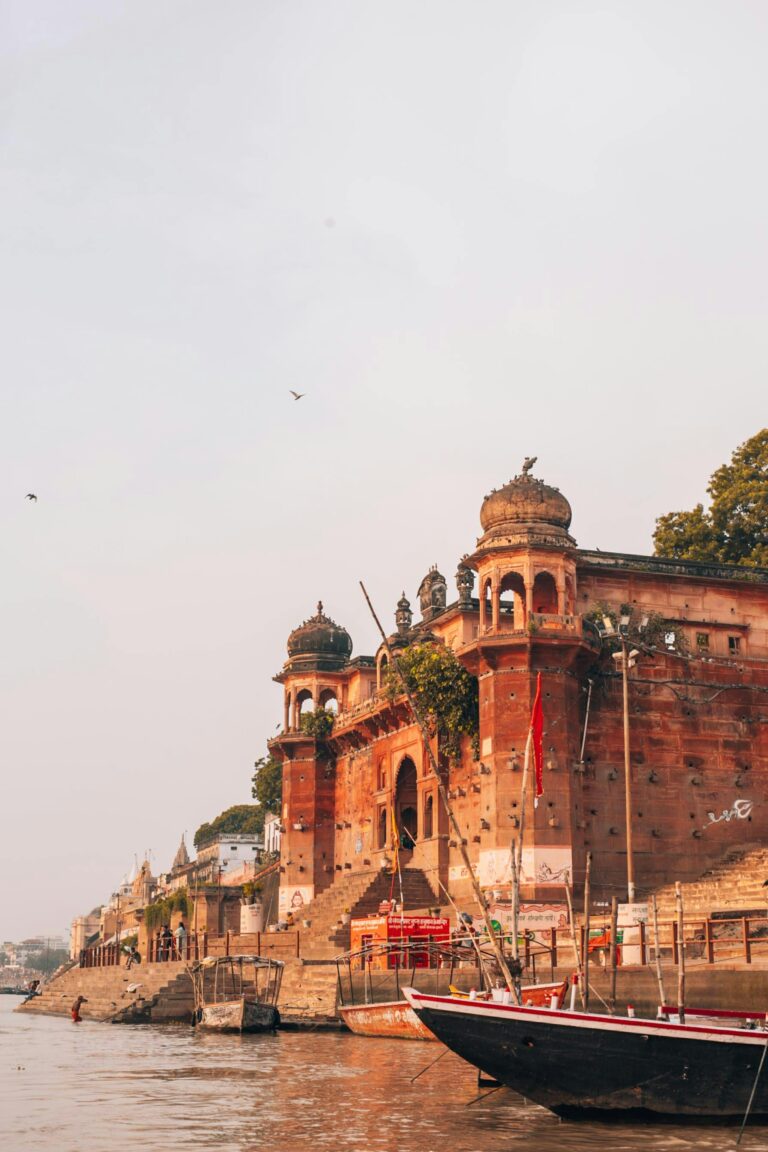
Education and Spiritual Life
Shri Nanddas Ji’s journey of learning and devotion began in the ancient and sacred city of Kashi (today called Varanasi).
It was there that he studied with none other than Goswami Shri Tulsidas Ji, his elder godbrother, and one of the greatest poets of Indian spiritual history.
In the silent halls of learning and under the soft glow of oil lamps, they dived deep into scriptures, languages, and the profound mysteries of the divine.
But while the mind of Shri Nanddas Ji was steeped in sacred knowledge, his heart danced to another rhythm—the enchanting rhythm of Rasleela, the divine play of Lord Shri Krishna.
From a young age, he was drawn to the vibrant, emotional, and mystical reenactments of Shri Krishna’s divine pastimes.
Whenever a Rasleela was being performed—whether in a village courtyard or beneath the stars in a holy grove—Shri Nanddas Ji would be there, completely immersed, watching with ecstasy.
He did not merely attend Rasleela as a spectator—he absorbed it as a seeker.
Each dance, each verse, each gesture became a sacred thread in the tapestry of his spiritual life.
This balance between spiritual scholarship and devotional ecstasy became the hallmark of Shri Nanddas Ji’s life. In the structured discipline of Kashi, he gained knowledge. In the spontaneous bliss of Rasleela, he found divine emotion. And together, they shaped him into the saint-poet who would later compose verses that captured both the wisdom of the mind and the longing of the soul.
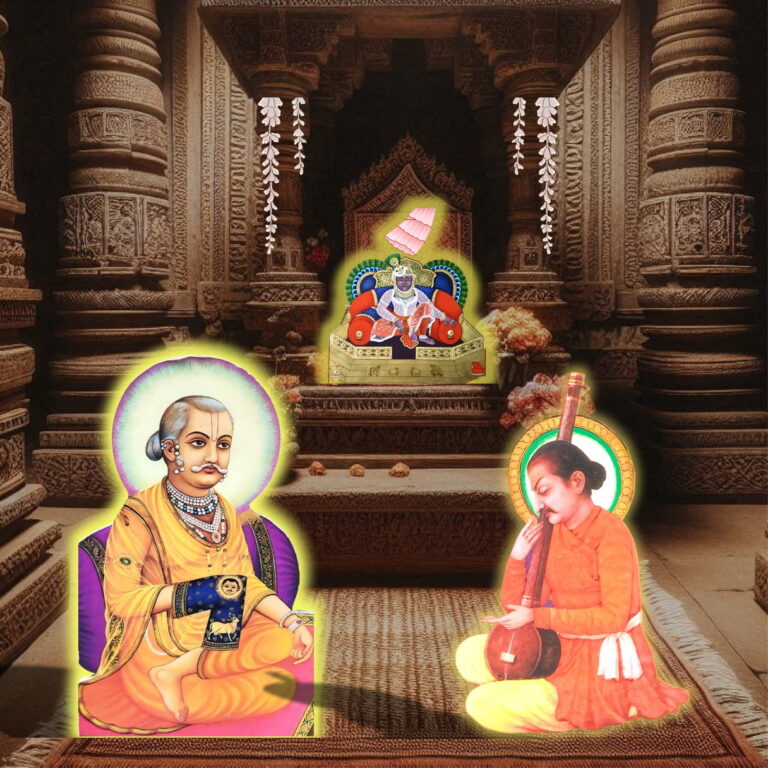
The Arrival in Braj
One day, a group of saints set out on a sacred journey to Shri Dwarka, eager to have darshan of Shri Ranchod Ji (a divine form of Lord Shri Krishna).
Hearing this, Shri Nanddas Ji was overwhelmed with longing, at the thought of having the darshan of Shri Ranchod Ji.
He joined the saints and began his journey.
The group traveled from Kashi and reached Mathura. There, the saints halted for an extended stay.
Nanddas Ji, unable to contain his restlessness, decided to continue the journey alone. However, as he traveled, somewhere along the way, he lost his direction and arrived at Nandgaon.
In Nandgaon, there lived a moneylender, a Kshatriya Vaishnava.
One day, as Nanddas Ji went from house to house seeking alms, he arrived at this man’s home. The moneylender’s wife was beautiful, and something in her presence mesmerized him.
From that day on, Nanddas Ji would sit for hours in front of her house. Only after seeing her face would he return to his humble hut. Days passed. This unusual behavior began to stir whispers in the village.
The woman’s husband and father-in-law, troubled by the attention and the rumors, decided to leave Nandgaon and shift to Gokul, where they were already disciples of Shri Gusain Ji (Shri Vitthalnath Ji).
Upon hearing of their departure, Nanddas Ji, began following them from a distance, “bound not by lust”, but by the unresolved pull of what he saw in her eyes.
Eventually, the Kshatriya family arrived at the banks of Shri Yamuna Ji. They boarded a boat to cross, and then the Kshatriya gave some money to the boatman and also instructed him not to allow the Brahmin (Nanddas Ji) to board on the boat.
The boatman obeyed. And so, Nanddas Ji was left behind.
The Kshatriya family reached Gokul and bowed before Shri Gusain Ji. But before they could say a word, Gusain Ji asked them,
“Why did you leave that Brahmin behind on the other side of Shri Yamuna? Why didn’t you bring him along?”
The Kshatriya man stood shocked. How could Gusain Ji have known? He hadn’t told anyone. Perhaps, the Lord Himself had spoken through his Shri Guru. Guilt rose in him like a tide.
Feeling remorseful, the Kshatriya confessed.
Shri Gusain Ji then sent a servant across Shri Yamuna waters to bring Nanddas Ji.
When Nanddas Ji arrived in Gokul and saw Shri Gusain Ji, he was struck motionless. He realized that he was standing before Shri Krishna himself.
In that moment, the very same vision he had unknowingly sought in the moneylender’s wife shone from the divine face of Shri Gusain Ji. All confusions melted. With hands folded in surrender and eyes filled with devotion, Nanddas Ji bowed low, offering his soul at the lotus feet of Shri Gusain Ji.
Shri Gusain Ji smiled and told him to go bathe. When Nanddas Ji returned, Shri Gusain Ji initiated him into the path of Pushtimarg, in the holy presence of (Lord) Shri Navneetpriya Ji.
Later, after the holy food was offered to the Lord, Shri Gusain Ji partook of it and distributed Mahaprasad to all Vaishnavas.
Shri Nanddas Ji sat among them and took the prasad. The moment the prasad touched his tongue, his body became still, his breath slowed, and his consciousness soared.
Shri Krishna’s divine pastimes began to unfold vividly in his heart. He remained seated, unmoving, immersed in the divine pastimes through the entire night.
In the morning, Shri Gusain Ji noticed. Gently leaning in, he whispered into Nanddas Ji’s ear,
“Nanddas, get up and have darshan.”
Nanddas Ji slowly opened his eyes, looked upon his Shri Guru, and sang:
“Praat Samay Shri Vallabhsutako Uthatahin Rasana Leejiye Naam”
– “On waking up in the morning, let your tongue chant the holy name of Shri Vallabhacharya’s son, Shri Vitthalnath Ji.”
Then he went for darshan of Shri Navneetpriya Ji, and as soon as his eyes met with the Lord, childhood pastimes of the Lord began to bloom in his heart. In that state of bliss, he sang:
“Bal Gopal Lalan Ko Mod Bhari Yashumati Hulrawat”
– “Mother Yashoda is joyfully and lovingly playing with Balagopal (Child Krishna).”
From that moment onward, Shri Nanddas Ji was never the same. He stayed constantly immersed in the divine pastimes of Lord Shri Krishna.
The woman he once longed to see passed before him many times—but he never looked at her again.
Such was the grace of Shri Gusain Ji. His divine presence had pulled Nanddas Ji completely away from the web of worldly desires and tied him forever to the lotus feet of the Lord.
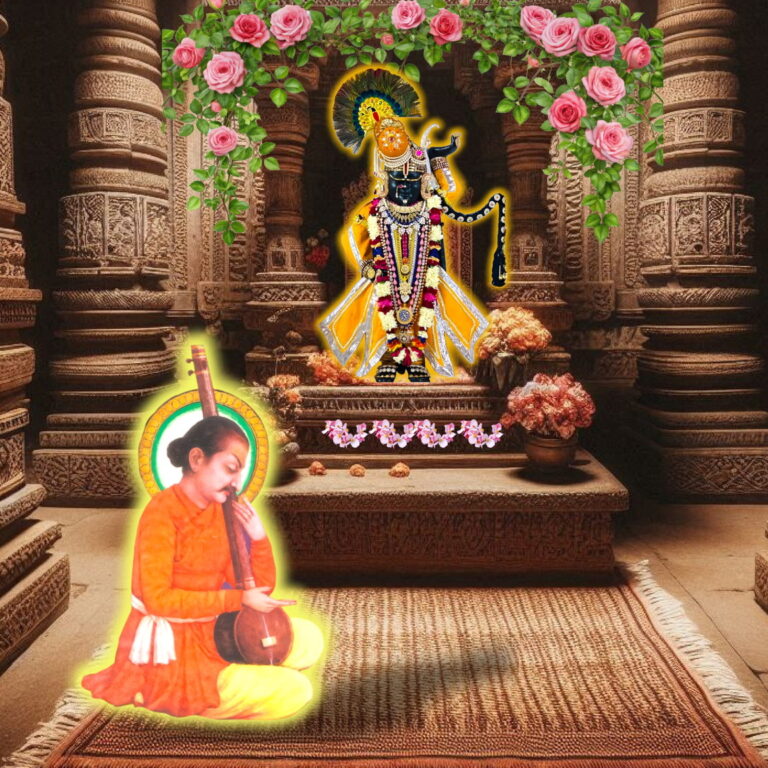
Youthful Pastimes of Shri Krishna Manifest in Shri Nanddas Ji’s Heart
After some time, Shri Gusain Ji journeyed to Govardhan with Shri Nanddas Ji.
There, Nanddas Ji received darshan of Shrinathji, and the moment his eyes met the Lord’s divine form, something eternal awakened within him.
The beauty of Shrinathji’s youthful form was so overwhelming, so radiant, that the playful pastimes of young Shri Krishna began to vividly manifest in his heart.
In that instant of divine inspiration, Nanddas Ji sang a verse,
Banate Sakhansang Gaayanke Paachhe Paachhe Aavat Mohanlaal Kanhayi.
– Shri Krishna, with His friends, walks behind the cows, following them gently from the forest.
Vana Te Aavat Gaavat Gauri.
– While returning from the forest, Shri Krishna sings in the melody of Raag Gauri.
Dekh Sakhi Hari Ko Vadan Saroj.
– O friend, Look at the beautiful lotus body Shri Krishna!
Ghar Nand Maharke Mishimis Awat Gokul Ki Nari.
– The Gopis of Braj, longing for a glimpse of Shri Krishna, come again and again to the house of Nanda Maharaj and Yashoda Rani on various pretexts.
These were not mere words—they were visions, living scenes, arising spontaneously in Nanddas Ji’s heart like waves stirred by a divine breeze. And this was only the beginning.
From that moment on, Shri Nanddas Ji composed many more verses, each one filled with the rasa, rhythm, and sweetness of Shri Krishna’s leelas.
He would sometimes remain in Govardhan, other times in Gokul, but wherever he was, his inner world was entirely immersed in the divine pastimes of the Lord.
To him, the rest of the world began to fade away. Its value diminished, its color dulled—compared to the vibrant life of Braj, it seemed empty and unreal.
From that point forward, Shri Nanddas Ji stopped going anywhere outside of Govardhan and Gokul.
Day and night, he contemplated the divine form of Shri Mahaprabhu Vallabhacharya Ji, Shri Gusain Ji, Shri Govardhan, Shri Yamuna, and Shri Braj Dham.
Other abodes of the Lord, no matter how grand or renowned, held no attraction for him.
And in Braj, Shri Nanddas Ji would stay—forever immersed in divine bliss.
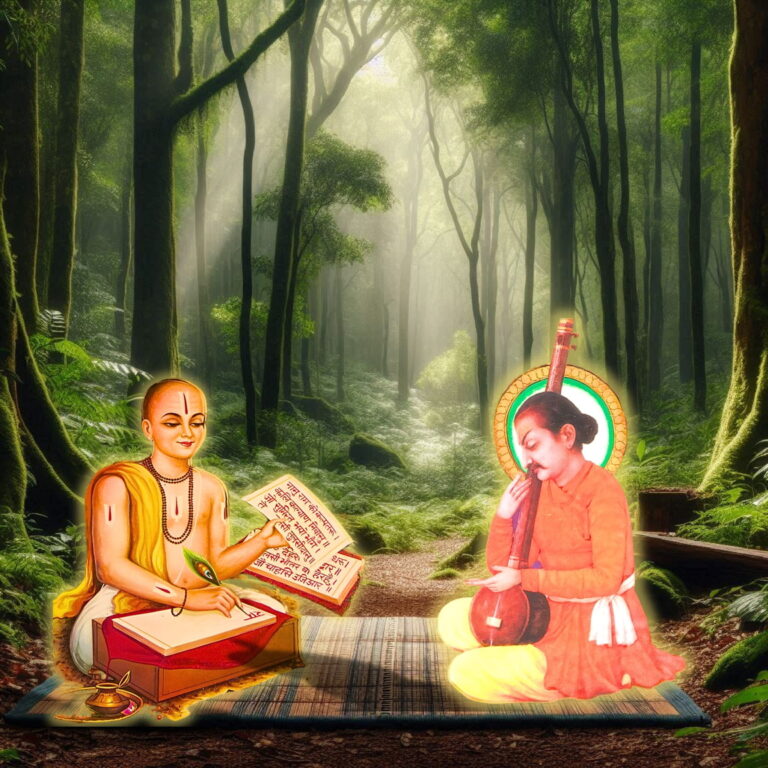
Goswami Tulsidas Ji’s Visit to Braj & A Divine Conversation
One day, Shri Tulsidas Ji, the elder godbrother of Shri Nanddas Ji, came to Braj from Kashi, wishing to meet his brother in devotion.
As he reached Mathura, he offered his respects to the sacred river Shri Yamuna Ji. From there, he journeyed to Govardhan, where he finally met Shri Nanddas Ji.
With affection and deep sincerity, Tulsidas Ji said,
“If you wish for village life, then live in Ayodhya. If you long for the holy city, then reside in Kashi. If the mountains call you, then go to Chitrakoot. And if the forest entices you, dwell in Dandakaranya. For wherever Shri Ramchandra Ji has walked, He has made those places sacred.”
Hearing this, Shri Nanddas Ji gently and smilingly responded with a verse—a pada born from the depths of his heart:
Jo Giri Ruche To Vaso Shri Govardhan, Gaam Ruche To Vaso Nandgaam.
– If you love mountains, dwell at Shri Govardhan. If villages attract you, live in Nandgaon.
Nagar Ruche To Vaso Shri Madhupuri, Shobha Sagar Ati Abhiram.
– If you prefer cities, live in Madhupuri (Mathura), an ocean of splendor and delight.
Sarita Ruche To Vaso Shri Jamun Tat, Sakal Manorath Pooran Kaam.
– If rivers draw your heart, then live on the banks of Shri Yamuna Ji, where all wishes are fulfilled.
‘Nanddas’ Kaanan Ruche To, Vaso Bhoomi Vrindavan Dham.
– Says Nanddas—if forests enchant you, then reside in the sacred land of Vrindavan.
After hearing this, Tulsidas Ji softly replied,
“Which sin exists in this world that cannot be washed away by the name of Shri Ram? Therefore, you should worship Shri Ramchandra.”
In response, Shri Nanddas Ji with divine feeling, calmly sang again:
Krishna Naam Jabaten Mein Shravan Sunyo Ri Aali Bhooli Ri Bhavan, Hon To Baavri Bhayi Ri.
– When I first heard the name of Krishna in my ears, O friend, I forgot my household; I became mad with love.
Bharbhar Aaven Nayan Chitahun Na Pare Chain Mukhhun Na Aave, Vain Tan Ki Dasha Kachhu Aur Rahi Ri.
– My eyes overflow with tears, my mind finds no rest, and no words come to my mouth—my body has fallen into a strange condition.
Jetek Nem Dharm Vrat Keene Ri Main Bahuvidh Angon Ang Bhay, Main To Shravan Mayi Ri.
– I have done a lot of pious works and fasting, but by hearing the name of Shri Krishna, every part of my body has become ears.
Nanddas Prabhu Jaake Shravan Sune Yah Gati, Madhuri Moorat Kedhon Kainsi Dayi Ri.
– Shri Nanddas Ji says, “If such a condition has happened just by hearing of whose name, then how will that sweet beautiful form be.”
Hearing this, Goswami Shri Tulsidas Ji remained silent, lost in thought.
After a while, Shri Nanddas Ji took Tulsidas Ji to have darshan of Shrinathji. Tulsidas Ji came too—but when he stood before the Lord, he did not bow. Nanddas Ji understood: Tulsidas Ji would never bow before anyone except Shri Ramchandra.
Thinking like this, Shri Nanddas Ji requested Shrinathji –
“Aajaki Sobha Kaha Kahoon, Bhale Viraaje Nath.
Tulsi Mastak Tab Name, Dhanushbaan Leo Hath.”
– O Lord, Your beauty today is beyond the reach of words, a vision too divine to describe. Yet Tulsidas Ji will only bow when You appear in the form of Shri Ram, bearing bow and arrow in hand.
Shrinathji, hearing the heartfelt request of a disciple of Shri Gusain Ji, accepted it with divine compassion.
In a flash, Shrinathji appeared to Tulsidas Ji in the form of Shri Ram, bearing a bow and an arrow in hand. The moment Tulsidas Ji saw this, his heart melted—and he bowed deeply.
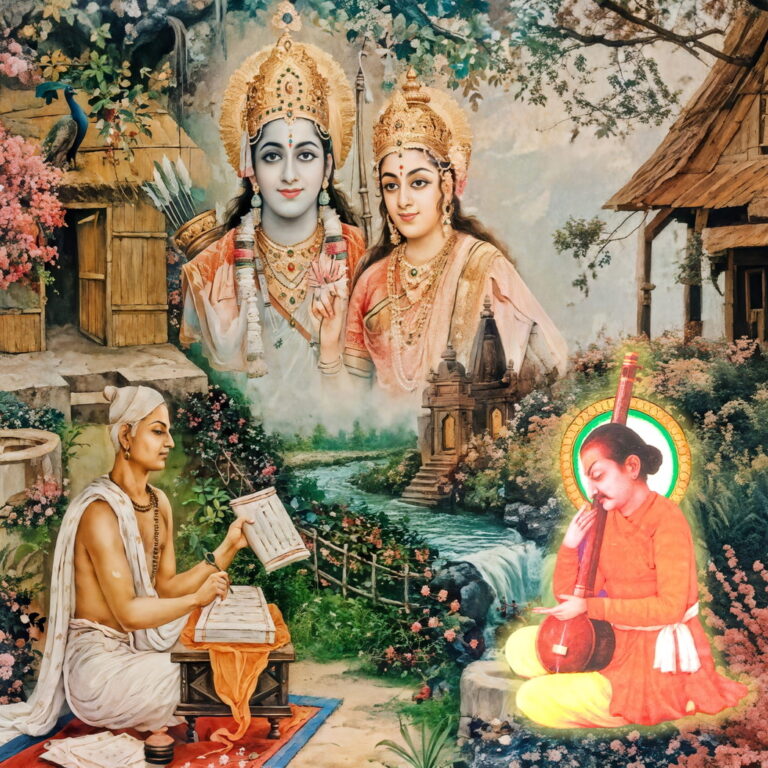
The Divine Form that Made Tulsidas Ji Bow In Reverence
After this divine darshan, Tulsidas Ji and Nanddas Ji left for Gokul, where Shri Gusain Ji was seated. Both saints bowed before him.
Tulsidas Ji then said to Nanddas Ji,
“Just as you granted me darshan of Shri Ram in Govardhan, let me behold Him here as well.”
Nanddas Ji turned to Shri Gusain Ji with reverence and requested,
“Jai Jai, he is my godbrother Tulsidas Ji. He bows only before Shri Ram. Please bless him with Lord Ram’s darshan.”
Gusain Ji smiled and said,
“Tulsidas Ji, sit here.”
Nearby stood Shri Raghunath Ji, the fifth son of Shri Gusain Ji, who was newly married.
Shri Gusain Ji said,
“Raghunath Ji, your servant has come. Give him darshan.”
And in that moment, Shri Raghunath Ji appeared to Tulsidas Ji in the form of Lord Shri Ram, and his wife, Shri Janaki Ji, appeared as Shri Sita Ji.
Tulsidas Ji saw them and bowed with reverence—and with joy he sang a verse called:
“Varano Aawadhi Gokulgaam…..”
After this sacred vision, Tulsidas Ji took leave and returned to Kashi.
And thus, such was the devotion of Shri Nanddas Ji, that at his humble request, Shrinathji revealed Himself to Tulsidas Ji in the divine form of Shri Ram.
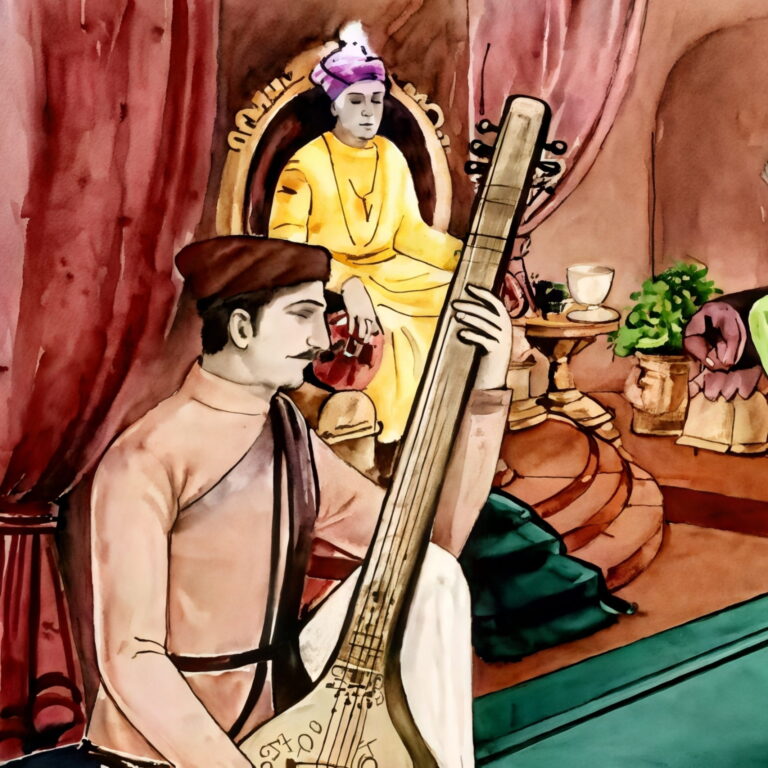
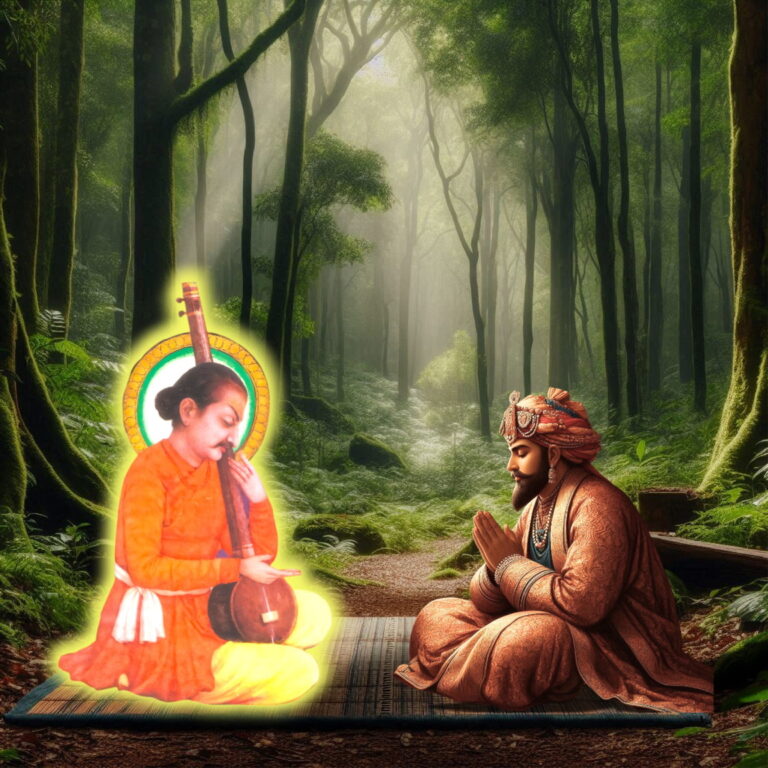
Tansen Sings Nand Das Ji's verse in Akbar's Court
Once, during a grand assembly in the royal court of Emperor Akbar, the renowned musician Tansen was performing a devotional composition written by Shri Nanddas Ji.
The verse he sang was filled with divine ecstasy:
“Dekho Dekho Ri Naagar Nat Nirtat Kaalindi Tat”
– “Shri Nanddas says, “Look at the beautiful form of Shri Krishna, he is dancing on the bank of Yamuna.”
Tansen’s voice echoed through the court. But it was the final line that left the entire audience, including the emperor, in wonder:
‘Nandadas’ Gaawe Tahan Nipat Nikat.
– “Nanddas is right there, singing and closely witnessing the divine dance.”
The words stunned Emperor Akbar. He turned to Birbal, amazed and curious, and said,
“How can Shri Nanddas claim to have been so near to Shri Krishna? What kind of vision is this?”
Eager to understand the mystery behind the verse, Akbar and Birbal journeyed together to Mansi Ganga, a sacred place in Braj, to meet Shri Nanddas Ji in person.
When they arrived, the emperor respectfully expressed his doubt, asking how Nanddas Ji could witness Shri Krishna’s divine dance so closely as if he were physically present in the leela.
Shri Nanddas Ji, immersed in divine love and radiating grace, smiled gently. Then, with tears of devotion in his eyes and his heart overflowing, he began to sing:
“Mohan Piy Ki Musakani, Dhalkani Mor Mukut Ki.
Sada Baso Man Mere Farkani Piyare Pat Ki.”
– “May the smile of Shri Krishna,
The drooping of His peacock crown and,
The flowing of his Peetambar (yellow robes) always remain in my heart.”
At that moment, Emperor Akbar understood that it was something beyond his ordinary logic.
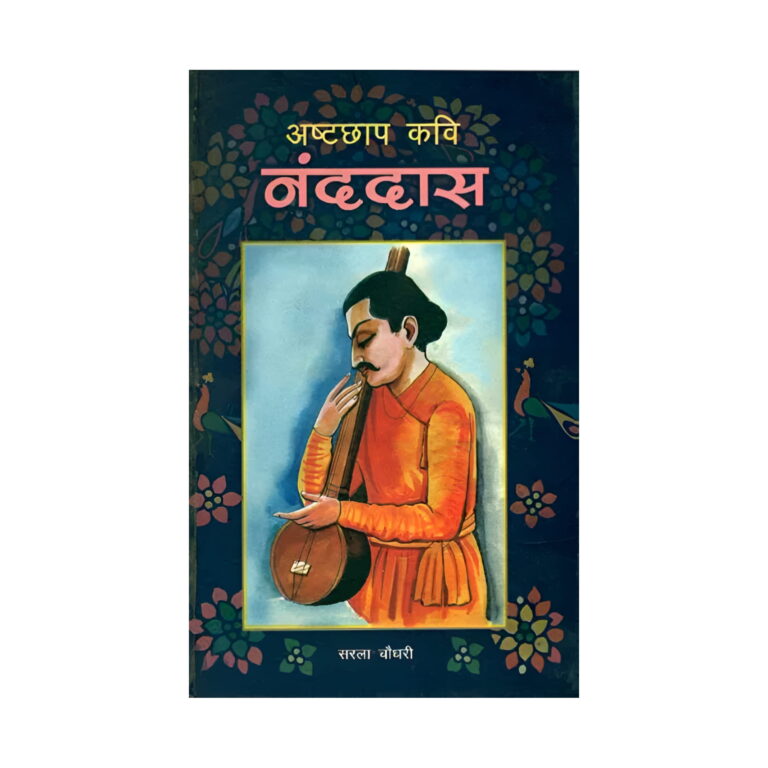
The Compositions of Shri Nand Das Ji
Shri Nanddas Ji, immersed in devotion and blessed with divine inspiration, composed a rich treasure of devotional literature.
His writings weren’t just poetry—they were sacred expressions of Shri Krishna’s leela, filled with deep emotion, spiritual wisdom, and the essence of divine love.
Among his many compositions, some of the most well-known include:
- Ras Panchadhyayi.
- Siddhant Panchadhyayi.
- Anekartha Manjari. Maan Manjari.
- Roop Manjari.
- Ras Manjari.
- Virah Manjari.
- Bhanvar Geet.
- Govardhan Leela.
- Syam Sagai.
- Rukmini Mangal.
- Sudama Charit.
- Bhasha Dashamskandha.
- Padavali.
Each of these works is a jewel in the crown of devotional poetry, revealing different shades of Shri Krishna’s personality—his leela, his beauty, his love, and the emotional world of those who adore him.
Through these compositions, Shri Nanddas Ji did not just write—he offered darshan through words, gifting generations with the chance to feel Shri Krishna, see Shri Krishna, and weep in love for Shri Krishna.
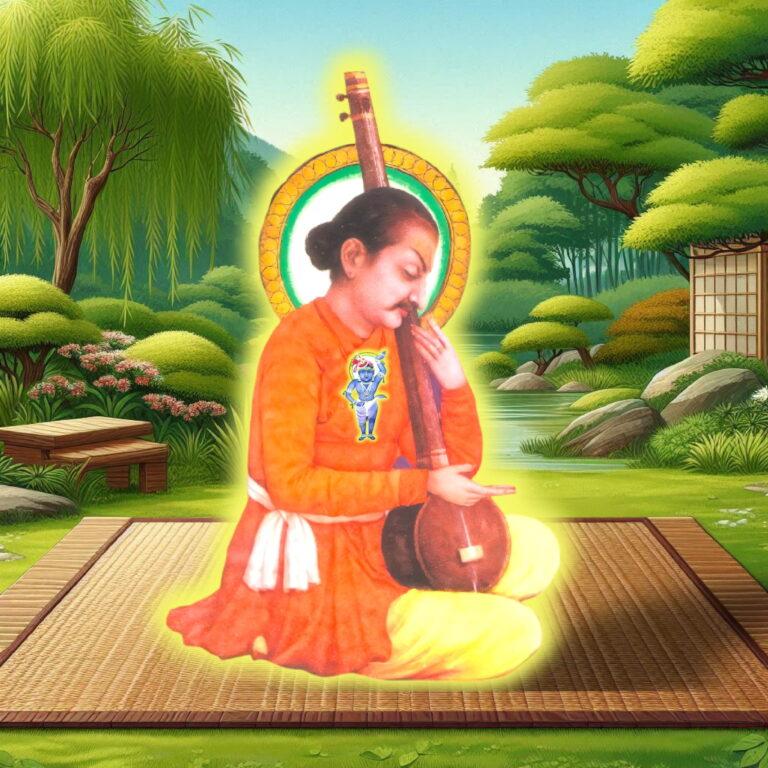
Few Verses of Shri Nand Das Ji
Nand Bhavan Ko Bhushan Maayi.
Yashuda Ko Lal, Veer Haladhar Ko, Radharaman Sada Sukhdayi.
Yashuda Ko Lal, Veer Haladhar Ko, Radharaman Sada Sukhdayi.
– All glories to Shri Krishna, the crown-jewel of (Shri) Nand’s palace, the beloved son of Yashoda, the brother of the brave Balram, and the source of joy for Shri Radha.
Indra Ko Indra Dev Devan Ko, Brahm Ko Brahm Adhik Adhikayi.
Kaal Ko Kaal, Eesh Eeshan Ko, Varun Ko Varun, Maha Balajayi.
– He is the Lord of Indra, The supreme personality of godhead, and the Ultimate Brahman, surpassing all in greatness. He is the Maha-kaal, the Lord of all Lords, The power of Varuna, and the Embodiment of immense strength.
Shiv Ko Dhan, Santan Ko Sarabas, Mahima Ved Puranan Gayi.
‘Nanddas’ Ko Jeevan Giridhar, Gokul Mandan Kunvar Kanhayi. [3]
‘Nanddas’ Ko Jeevan Giridhar, Gokul Mandan Kunvar Kanhayi. [3]
– He is the Supreme treasure of Lord Shiva, the Essence of saints, and His glory is celebrated in the Vedas and Puranas. Shri Nandadas Ji says, “Giridhar Shri Krishna is my very life, the Splendor of Gokul, and affectionately known as Kunwar Kanhaiya to all.
– Shri Nand Das Ji (Nanddas Granthawali)
———-
Jakaun Ved Ratat, Brahma Ratat, Shambhu Ratat, Shesh Ratat.
Narad Shuk Vyas Ratat, Pavat Nahin Par Ri.
– Lord Shri Krishna, whose name the Vedas chants, Lord Brahma chants, Lord Shiva chants, Lord Ananta chants, (Shri) Narad, Shukdev, and Veda Vyas chants, but is beyond their comprehension.
Dhruvjan Prahlad Ratat, Kunti Ke Kunvar Ratat.
Drupad Suta Ratat Nath, Anathan Pratipal Ri.
– The great devotees Dhruva and Prahlad chant the name of Shri Krishna, Kunti’s son Arjun chants, and Draupadi chants His name as well, is the protector of the destitute.
Ganika Gaj Geedh Ratat, Gautam Ki Nari Ratat.
Rajan Ki Ramani Ratat, Sutan Dayi Dayi Pyar Ri.
– The courtesan chants the name of Shri Krishna, the king of vultures Jatayu chants, the king of elephants Gajendra chants, Gautam’s wife Ahilya chants, and the queen chants and gives love to their sons.
Nanddas Shri Gopal, Girivardhar Roop Jal.
Jasoda Kau Kunvar Lal, Radha Urhar Ri.
– Shri Nanddas Ji says that it is the same Shri Gopal, the upholder of Govardhan hill, the dear son of Yashoda, who has enchanted everyone’s heart with His beautiful form, remains the necklace of the heart of Shri Radha.
– Shri Nand Das Ji (Nanddas Granthawali) Padavali
